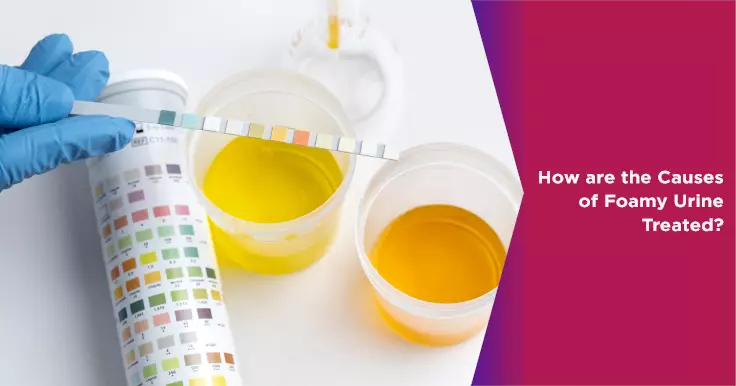How Are the Causes of Foamy Urine Treated?

Foamy urine is not a problem in itself. But it can be an indication of many underlying medical conditions, some of which can be serious as well. That's why it is important that you undergo a proper diagnosis and get it treated by a doctor.
Foamy Urine Diagnosis
Diagnosis is the first step of foamy urine treatment. Generally, your urine sample will be tested to determine if the protein level is high. In case the amount of protein is found to be higer than the normal levels, the doctor may ask you to undergo a 24-hour urine test.
This test is done by collecting all the urine that a person produces throughout a day. The test involves a comparison of between the levels of albumin, which is a primary protein found in the blood, and creatinine, which is a waste product produced by the metabolism of creatinine. If the urine albumin to creatinine ratio (UACR) is found to be higher than average, the doctor may recommend further tests to confirm the malfunctioning of the kidneys.
If your doctor suspects retrograde ejaculation as a cause of your foamy urine, he or she will check for sperm in your urine.
Causes and Treatment of Foamy Urine
Causes and treatment of foamy urine depends on the following underlying causes:
- Dehydration
- Retrograde ejaculation
- Certain UTI medication
- Kidney problems
- Diabetes
If the cause is found to be concentrated urine, drinking an adequate amount of water and other fluids can overcome dehydration and stop foamy urine. When the underlying cause is diabetes, your doctor may prescribe medications and/or insulin injections to bring down your blood sugar levels.
If the cause is related to your kidney functioning, your doctor may recommend certain lifestyle changes and even dialysis in extreme cases of poor kidney functioning.
Since the treatment of foamy urine can begin only after proper diagnosis, it is necessary to reach out to a doctor if you feel that you have this condition.
 Infertility Counselling
Infertility Counselling Female Infertility Treatment
Female Infertility Treatment Andrology Treatment
Andrology Treatment Fertility Enhancing Surgeries - Female
Fertility Enhancing Surgeries - Female Fertility Enhancing Surgeries - Male
Fertility Enhancing Surgeries - Male Endoscopy Treatment
Endoscopy Treatment IUI Treatment
IUI Treatment IVF Treatment
IVF Treatment ICSI Treatment
ICSI Treatment Advanced IVF Solutions
Advanced IVF Solutions Embryology
Embryology Vitrification Egg, Embryo, Sperm Freezing
Vitrification Egg, Embryo, Sperm Freezing Preimplantation Genetic Testing (PGT)
Preimplantation Genetic Testing (PGT) Donation Program Embryo / Egg / Sperm
Donation Program Embryo / Egg / Sperm Self-cycleTM IVF
Self-cycleTM IVF

 Self-cycleTM IVF
Self-cycleTM IVF










